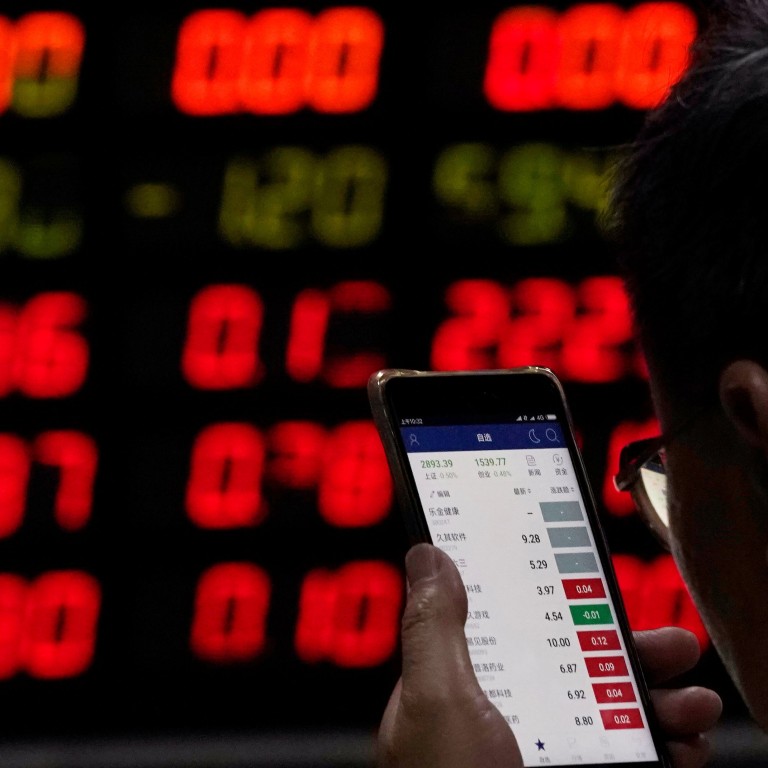
China stocks end mixed ahead of key briefing by new stock regulator chief
- Yi Huiman, head of China Securities Regulatory Commission, expected to shed light on new tech board, reforms during Beijing press conference
China stocks see-sawed and ended mixed on Wednesday as selling escalated when the Shanghai benchmark tested a key level ahead of a briefing by the chairman of the nation’s stock regulator.
The Shanghai Composite Index closed 0.4 per cent higher at 2,953.82. The benchmark surged 1.9 per cent to an intraday high of 2996.03 in the afternoon – just points away from the psychologically important level of 3,000 points – but later pared some of the gains as selling forces strengthened around the level.
The Shenzhen Composite Index fell 0.6 per cent, and the CSI 300 Index of large companies eased 0.2 per cent. The Shanghai benchmark and the CSI 300 Index entered a bull market in a dramatic rally on Monday, which lifted the cumulative gain to more than 20 per cent from their January lows.
“There are market voices that believe the Shanghai Composite Index will have to correct and consolidate when it touches 3,000 points, and this has affected some investors’ decisions,” said Lu Shunxi, a Shanghai-based investment director who was speaking in a private capacity.
Turnover on China’s markets stood at 891 billion yuan (US$133 billion), easing from the 1 trillion yuan achieved on both Monday and Tuesday but still nearly three times the average daily turnover over the past three months.
Traders were also waiting for a clearer signal on the setting up of a new technology board and market reforms from Yi Huiman, the newly-appointed chairman of the China Securities Regulatory Commission. Yi was set to hold a press conference in Beijing after the market close on Wednesday, his first since he took office in late January.
“The market is hopeful that Yi will introduce beneficial policies and reforms, given that the CSRC has already scrapped the automatic margin call threshold,” said Kenny Tang Sing-hing, chief executive of China Hong Kong Capital Asset Management.
Under Yi, the watchdog has announced a handful of rule changes, including the removal of the margin call requirement, to support the market.
Investors hope Yi will be able to revive confidence in the world’s second-largest stock market and push forward with stalled reforms. Stocks with names that share the same characters as Yi’s soared on the first trading day after his appointment.
Banks, insurers and securities brokerages led the advance on Wednesday, having become the top market performers this year as China turns away from deleveraging to a loosened monetary policy.
The state-owned People’s Insurance Company (Group) of China jumped by 10 per cent daily limit to a historical high of 8.4 yuan in Shanghai. China Life Insurance rose 2.6 per cent.
Chinese liquor stocks also surged after manufacturer Sichuan Swellfun announced its controller planned to increase its stake in the company to 70 per cent from 60 per cent, at a price of 45 yuan per share. Shares of the company soared by their 10 per cent daily limit to 41.5 yuan.
In Shenzhen, technology shares led the decline as investors took profit from the recent rally.
Communications equipment provider Eastern Communication plunged by the daily limit of 10 per cent to 28.5 yuan, after it surged 10 per cent in 10 out of the past 12 trading sessions.
China stocks have made a stunning turnaround from being the world’s worst-performing major market in 2018 to the best this year.
The Shanghai and Shenzhen markets have added US$1.1 trillion in market capitalisation since the beginning of this month, surpassing Japan to become the world’s second-most valuable market after the US.
The rally has been driven by hopes for a resolution to the US-China trade war and loosened monetary and fiscal policies. A speech by Chinese President Xi Jinping over the weekend that stressed the importance of financial market reforms also boosted sentiment.
Technical measures such as the 14-day relative strength index (RSI) indicate China has also become the world’s most overbought market. The 14-day RSI has shot up to 84, its highest level since April 2015, at the height of one of China’s worst market bubbles.
In Hong Kong, the Hang Seng Index slipped 0.1 per cent to 28,757.44, after the latest government data showed the city’s economy expanded by 3 per cent in last year from the year before, lower than the expected 3.2 per cent. The growth was weighed by the trade war and China’s slowing economy.
Hong Kong Exchanges and Clearing, the operator of the city’s stock exchange, declined 0.7 per cent to HK$268, after it reported a 26 per cent surge in 2018 profits to HK$9.3 billion.

